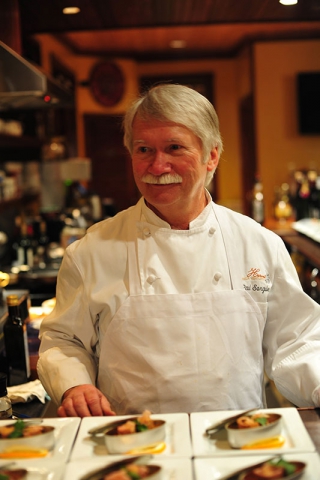
Think About the Big Impact You Make with Students
31 October 2018Teaching students is an honor and educators can change the world one student at a time.
By Paul Sorgule, MS, AAC
It was Chef Tom Bivins, who now works as the director for the Vermont Cheese Council, who told me as an educator he hoped to, “Change the world one student at a time.” This is quite an ambitious goal, very profound, and actually quite doable.
What is it that we teach and leave our students with that has the greatest impact on the food industry and society as a whole? Isn’t one of education’s goal to help students’ find their guiding philosophy – their stakes in the ground?
"Teachers, I believe, are the most responsible and important members of society because their professional efforts affect the fate of the earth."
--Helen Caldicott
The opportunity exists to relay information and build skill competency. Instructors can also provide a deeper understanding of the larger picture and role that each future chef, restaurateur, and manager can play in making the industry and world a better place. Knowledge and true understanding is a powerful tool; a tool that in the right hands can make a significant difference.
"The art of teaching is the art of assisting discovery."
--Mark Van Doren
What are we doing to provide a deeper understanding of the challenges and opportunities these future chefs will face? We need to help each future cook, chef, manager, and owner understand just how important their actions are and the way to act and react. Are we preparing students to have the confidence in knowledge and the power of truth to make a difference in the world around them? Whether these students grow to become chefs, owners, managers, producers, writers, or activists for change – it will be the confidence in validated knowledge and the willingness to listen that makes each of them effective voices for a generation. Do we have a role to play in bringing this to fruition?
How often do we take the time to relay the stories of farmers, producers, advocates for food integrity, honorable vendors, and supportive operators who treat employees and guests with respect knowing how critical this is to eventual business success? Are we painting this picture for our students while relaying the in’s and out’s of cost control, menu planning, and the laws surrounding human resource management? Do we take the time to talk about where that carrot, potato, or tomato came from, how difficult it is to manage its growth cycle, and how much authentic care goes into nurturing the crop? Do we take the time to talk about the life of cattle, chickens, pigs, and lambs as they are born, milk feed, pastured, lot fed to fatten them, and moved on to their sacrifice for our eating pleasure? What type of cook or chef will our students become without this level of understanding and appreciation? Think about the impact this knowledge can have on restaurants, the dining public, and the industry as a whole. Changing the world one student at a time does not infer that we should try to sway a student’s opinion about these larger issues. It provides the full story so students can choose what they will believe in and how they will act as members of society.
“The best teachers are those that show you where to look but don't tell you what to see.”
-- Alexandra K. Trenfor
We have a tremendous amount of influence on the students who pass through our kitchens. We certainly are responsible for building their skills and confidence in front of a range, but we also have an opportunity, and maybe an obligation to help them become honest, caring, empathetic, appreciative, and strong-willed individuals who just happen to wear a double-breasted white jacket.
The challenges that face the food industry can be addressed and resolved by this next generation of professionals – the ones standing next to that stainless steel prep table and the ones sitting in your classroom. These students are waiting to hear what you have to say, waiting to see how you act, and waiting to challenge what you have to offer if it does not align with their current understanding and beliefs. Choose your words and actions wisely – you have the power to influence them in untold ways. You do have the power to change the world – one student at a time.
October 20 was International Chef’s Appreciation Day – the world appreciates a great plate of food and has learned to take note of the people who prepare it. Those future chefs whom we all appreciate are facing you every day waiting to learn and grow. What an honor it is to teach them.
Paul Sorgule, MS, AAC, president of Harvest America Ventures, a mobile restaurant incubator based in Saranac Lake, N.Y., is the former vice president of New England Culinary Institute and a former dean at Paul Smith’s College. Contact him at This email address is being protected from spambots. You need JavaScript enabled to view it..
